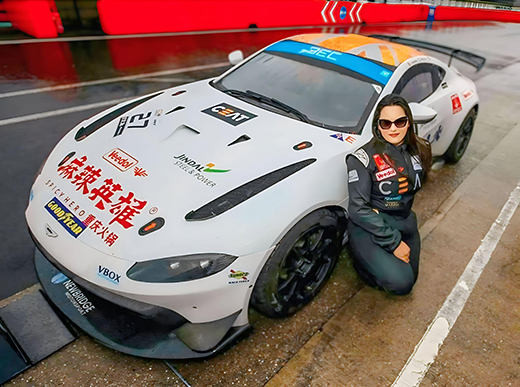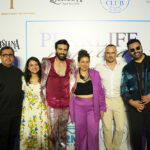By Kratika Agarwal
In a world where motorsport is often seen as a male-dominated domain, one woman from Jammu & Kashmir has carved out a legacy that is as inspiring as it is groundbreaking. Growing up in a conservative society, Humaira Mushtak’s story is not just about fast cars and thrilling races—it’s about resilience, breaking stereotypes, and championing equality. From the go-kart tracks of her childhood to the prestigious British Endurance Racing Championship, her journey is a testament to the power of passion and persistence.
In an exclusive interview with PEAKLIFE, Humaira Mushtaq opens up about her challenges, triumphs, and dreams for the future, offering an unfiltered look at what it takes to be a trailblazer in Indian motorsport.
Can you share when and how your passion for motorsport began? Was it a dream you’ve had since childhood?
I grew up in a traditional Muslim family in Jammu & Kashmir, a place where you rarely see women driving, let alone racing. But from as early as I can remember, I was drawn to cars. I was around three or four when my dad gave me my first toy car, and I was hooked. I was not the kind of kid who played with dolls; I preferred hanging out with boys because they had toy cars! My dad picked up on this and when I was four, he got me a custom-made go-kart track. That is really where it started—and I spent hours there practicing. By five, I was competing with boys in professional go-karting championships, and I loved every bit of it. It later escalated and advanced, and I moved to single-seaters, Formula racing, saloons, touring cars, advanced Formula and GT (grand tourers).
Growing up in a conservative environment, how did you cope with societal criticism and what challenges did you face?
Being a woman in motorsport has meant breaking down a lot of walls. Initially, people doubted my ability just because of my gender. I was working with this new team in the UK who hadn’t seen me racing before and assumed that I couldn’t handle the technical demands or pressure. Which obviously changed after 5 laps when they saw me setting the lap records. I knew I had earned my place, and I was determined to give it my best shot. Even personally, people could not understand why I wanted to pursue such an unconventional path. When I told people I wanted to race, there was a lot of resistance and disapproval. Many told me to “back off” or tried to make me feel that motorsport wasn’t a place for women. But each of those experiences just strengthened my resolve.
What was your experience like competing in the British Endurance Racing Championship, and how did you handle the pressure of being the only Indian woman driver?
It was surreal and overwhelming at the same time. Representing India at the British Endurance Racing Championship, racing for Aston Martin, felt like a dream. But it was also a huge responsibility. I wasn’t just representing myself; I was there for my country and for women everywhere who dream of breaking barriers. There was scepticism from some of my male teammates and competitors. But once I started racing, I earned their respect on the track. Competing there as the only Indian woman on the grid was challenging, but it felt incredibly empowering. I knew I was setting an example, and that kept me going.

Can you share how you are mentally and physically preparing for the upcoming GT Racing events in the Middle East?
Every day, I focus on both physical and mental preparation, which is essential in racing. My training routine involves a mix of cardio, strength training, and mental exercises that help me maintain focus under pressure. Racing is physically demanding, so I work hard on my stamina and reflexes. I also make sure to include meditation and visualisation exercises. I practice visualising each corner and turn, imagining the speed and the way the car responds. I have learnt that in racing, mental endurance is as crucial as physical strength.
You’ve mentioned that gender shouldn’t divide talent. How do you advocate for equality in motorsport, and what changes do you hope to see?
I strongly believe that talent knows no gender, and it’s essential to recognise and nurture skills regardless of whether you’re a man or a woman. I’ve always emphasised the importance of creating opportunities and providing a level playing field for women to participate and compete. One significant change I hope to see is increased representation of women, not just as drivers, but also in technical and leadership roles. We need more women in paddocks, pits, and boardrooms to break the stereotype that motorsport is a male-dominated sport. Furthermore, I’d like to see more initiatives and programs, such as scholarships, training programs, and mentorship opportunities.
What advice would you give to young girls who want to follow in your footsteps?
My message is simple: if you have the passion and you’re willing to put in the work, there’s no reason you can’t achieve it. Racing is not just for men—it’s for anyone with the skill and drive. You have the power to create your own reality; all it takes is the willingness to do it.
Who were your role models in motorsport, and how did they influence your journey?
My father was my biggest supporter from the start. When people questioned my dreams, he was always there, building tracks for me, taking me to races, and supporting me in every way he could. Unfortunately, I lost him just a few days before my 14th birthday. My dad’s last words to me were, “Don’t stop racing; become a professional. You have this rarest talent, which not a lot of people have. Reach out to the world and create an example.” On my journey, I faced a lot of patriarchy while I was advancing, but I also had the support and special guidance of Hardy sir, aka Sanjay Sharma, who heads JK Tyre Motorsport.
What are your immediate goals for the next stage of your career?
My immediate goals for the next stage of my career are to continue pushing the boundaries of what’s possible for a woman in motorsport. Starting March 2025, I’m taking part in GT races.
And lastly, what kind of legacy do you hope to leave behind?
I hope to leave a legacy that inspires and empowers future generations of women to pursue their passion for racing. I want to be remembered as a pioneer who broke down barriers and challenged stereotypes, proving that women can compete and succeed at the highest levels of motorsport. Ultimately, I hope my legacy will contribute to a more inclusive and diverse motorsport community, where women are represented and celebrated in equal measure. I want to be a beacon of hope and inspiration for anyone who dares to dream big.












